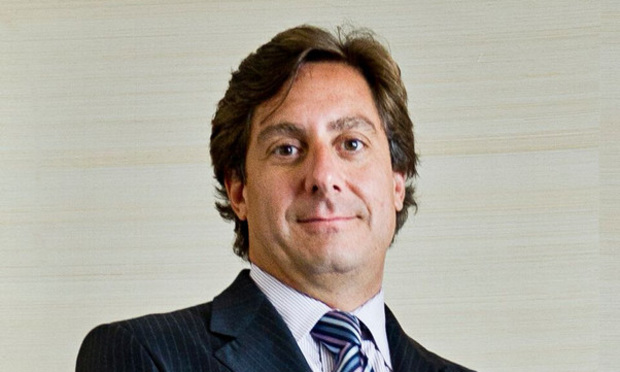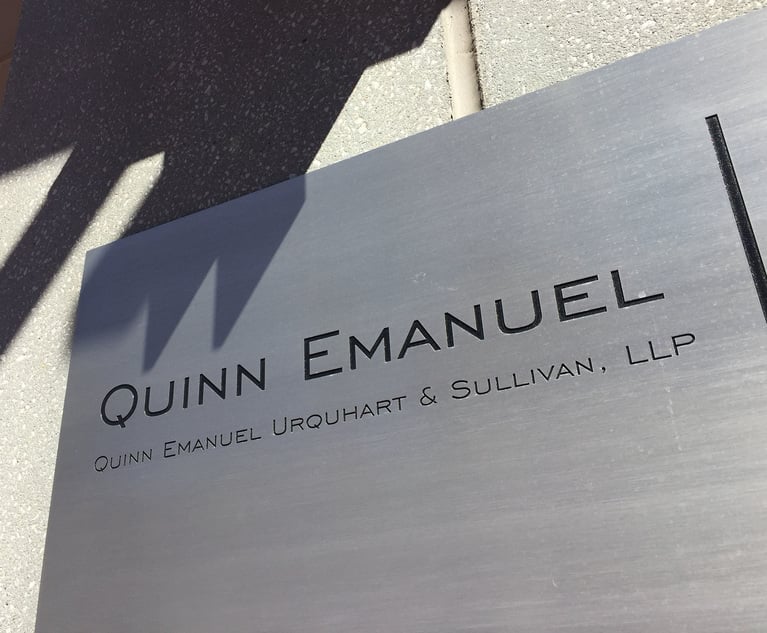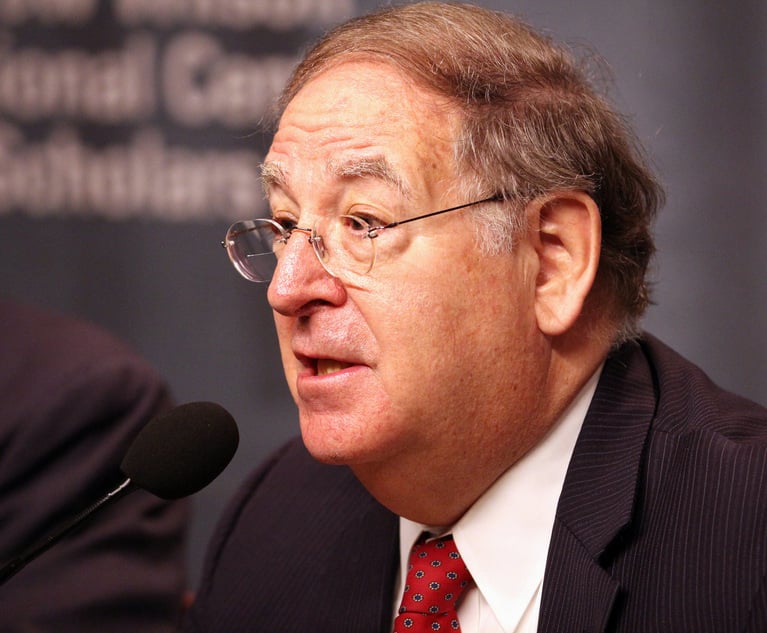Opioid Judge Allows Some Discovery, Motions to Go Forward in MDL
U.S. District Judge Dan Polster in Cleveland told lawyers in the multidistrict litigation to come up with a plan by March 16 over the scope and timing of a “litigation track.”
March 07, 2018 at 06:14 PM
6 minute read

Following two months of settlement talks, a federal judge overseeing hundreds of opioid lawsuits has allowed lawyers to proceed with some discovery and motion filings.
In a minute order on Wednesday, U.S. District Judge Dan Polster in Cleveland told lawyers in the multidistrict litigation to come up with a plan by March 16 over the scope and timing of a “litigation track.”
“The parties reported important and substantial progress on several fronts, but also identified various barriers to a global resolution,” he wrote. “To varying degrees, the parties agreed that the quickest way to surmount at least some of these barriers is to put into place a limited litigation track, including discovery, motion practice and bellwether trials.”
It's a marked shift for Polster, who has focused almost entirely on settling the cases. At a Jan. 9 hearing, he told lawyers he wasn't interested in “a whole lot of finger-pointing,” discovery, trials or answers to “interesting legal questions.” But Polster also directed special masters to continue settlement talks with dozens of lawyers in the MDL. He's also scheduled a settlement conference for May 10.
Plaintiffs lawyers with opioid cases said Polster's order, which followed a hearing on Tuesday, acknowledged that a settlement could not happen without the pressure of trial.
“The parties all pretty much agreed that the settlement efforts to try to do something now that would specifically address the continued marketing, sale and use of opioids is one thing that everybody's interested in,” said Joe Rice of Motley Rice, who is co-lead counsel in the opioid MDL. “But there's still another piece of the puzzle: That is, there are claims for damages for past conduct.”
He added “the defendants legitimately believe there are some legal defenses that as a matter of law they should be able to put forth, and plaintiffs believe there has to be more transparency in discovery related to what has taken place. And both parties believe you have to use the tools the court has available to allow the parties to develop both their affirmative claims and their defenses.”
Plaintiffs lawyers have pressed for a U.S. Drug Enforcement Administration database that would indicate which defendants sold most of the prescription painkillers, and in what amounts. The U.S. Department of Justice haggled over the request for months. On Monday, less than a week after Attorney General Jeff Sessions announced the DOJ's new opioid task force, government lawyers agreed to release the data as long as it was confidential. Polster approved that protective order.
A lot more discovery is needed, lawyers say.
“We want to go back and get the internal minutes, documents, emails, any type of meeting,” said Jere Beasley of Montgomery, Alabama's Beasley, Allen, Crow, Methvin, Portis & Miles, which filed the state of Alabama's opioid lawsuit against Purdue Pharma last month in federal court. “And whether they had industrywide communication as to some type of claims.”
He expected Polster's discovery orders to be aggressive.
“He recognizes the magnitude of the problem,” Beasley said. “He would prefer a quick settlement, but he'd have to realize it's not going to be a quick settlement. He knows discovery has to take place.”
Rice wouldn't say what discovery or motions would be the focus of the litigation track. Generally, he said, plaintiffs attorneys in such cases would ask for documents, emails and other communications from the defendants and talk to third parties, such as doctors, “about what they were told about the drugs.”
With cases involving a drug approved by the U.S. Food and Drug Administration, such as opioids, plaintiffs lawyers anticipate issues such as federal pre-emption and standing, he said.
In fact, both of those issues were among the myriad arguments raised in a motion to dismiss that several opioid manufacturers filed before Suffolk County Supreme Court Judge Jerry Garguilo, who is overseeing cases brought by New York counties. He has scheduled a motion-to-dismiss hearing for March 19.
Garguilo also has allowed some discovery to go forward.
“Judge Garguilo has recognized—and as recently as last week talked about —the discovery needs to be ongoing so that the parties understand the information that's out there to be able to frame a proper settlement,” said Paul Napoli of Napoli Shkolnik, whose firm is co-lead counsel in cases brought by the New York counties. “Not many cases that I can think of in my 20-year career have settled without the threat of trial. And, particularly with so much information out there, and so many different parties, we need that information to frame an appropriate settlement.”
Napoli has asked the judge to conduct four bellwether trials in New York this fall. In a March 1 letter to the judge, he wrote that the plaintiffs, as governmental entities, have trial preference under New York law. The manufacturing defendants, in a letter on Tuesday written by Purdue Pharma attorney Mark Cheffo, a New York partner at Quinn Emanuel Urquhart & Sullivan, said an expedited trial is “contrary to the orderly procedures the court has set to guide how these cases should proceed.”
On Wednesday, Neil Roman, a lawyer for McKesson Corp. and a partner at New York-based Covington & Burling, joined that argument in his own letter on behalf of his client and two distributor defendants: Cardinal Health Inc. and AmerisourceBergen Drug Corp.
“They don't want the day of reckoning to come, and we think it needs to come sooner or later, and we're prepared to put our resources in the case between now and November,” Napoli said. “If he does try a case in November, it'll be the first case to go to trial in the United States, and it will be an important turning point in the litigation.”
This content has been archived. It is available through our partners, LexisNexis® and Bloomberg Law.
To view this content, please continue to their sites.
Not a Lexis Subscriber?
Subscribe Now
Not a Bloomberg Law Subscriber?
Subscribe Now
NOT FOR REPRINT
© 2025 ALM Global, LLC, All Rights Reserved. Request academic re-use from www.copyright.com. All other uses, submit a request to [email protected]. For more information visit Asset & Logo Licensing.
You Might Like
View All
Quinn Emanuel Files Countersuit Against DOJ in Row Over Premerger Reporting
3 minute read
'Thoughtful Jurist': Maryland US District Senior Judge Messitte Dies After Short Illness
4 minute read
'Religious Discrimination'?: 4th Circuit Revives Challenge to Employer Vaccine Mandate
2 minute read
4th Circuit Revives Racial Harassment Lawsuit Against North Carolina School District
3 minute readTrending Stories
- 1Relaxing Penalties on Discovery Noncompliance Allows Criminal Cases to Get Decided on Merit
- 2Reviewing Judge Merchan's Unconditional Discharge
- 3With New Civil Jury Selection Rule, Litigants Should Carefully Weigh Waiver Risks
- 4Young Lawyers Become Old(er) Lawyers
- 5Caught In the In Between: A Legal Roadmap for the Sandwich Generation
Who Got The Work
J. Brugh Lower of Gibbons has entered an appearance for industrial equipment supplier Devco Corporation in a pending trademark infringement lawsuit. The suit, accusing the defendant of selling knock-off Graco products, was filed Dec. 18 in New Jersey District Court by Rivkin Radler on behalf of Graco Inc. and Graco Minnesota. The case, assigned to U.S. District Judge Zahid N. Quraishi, is 3:24-cv-11294, Graco Inc. et al v. Devco Corporation.
Who Got The Work
Rebecca Maller-Stein and Kent A. Yalowitz of Arnold & Porter Kaye Scholer have entered their appearances for Hanaco Venture Capital and its executives, Lior Prosor and David Frankel, in a pending securities lawsuit. The action, filed on Dec. 24 in New York Southern District Court by Zell, Aron & Co. on behalf of Goldeneye Advisors, accuses the defendants of negligently and fraudulently managing the plaintiff's $1 million investment. The case, assigned to U.S. District Judge Vernon S. Broderick, is 1:24-cv-09918, Goldeneye Advisors, LLC v. Hanaco Venture Capital, Ltd. et al.
Who Got The Work
Attorneys from A&O Shearman has stepped in as defense counsel for Toronto-Dominion Bank and other defendants in a pending securities class action. The suit, filed Dec. 11 in New York Southern District Court by Bleichmar Fonti & Auld, accuses the defendants of concealing the bank's 'pervasive' deficiencies in regards to its compliance with the Bank Secrecy Act and the quality of its anti-money laundering controls. The case, assigned to U.S. District Judge Arun Subramanian, is 1:24-cv-09445, Gonzalez v. The Toronto-Dominion Bank et al.
Who Got The Work
Crown Castle International, a Pennsylvania company providing shared communications infrastructure, has turned to Luke D. Wolf of Gordon Rees Scully Mansukhani to fend off a pending breach-of-contract lawsuit. The court action, filed Nov. 25 in Michigan Eastern District Court by Hooper Hathaway PC on behalf of The Town Residences LLC, accuses Crown Castle of failing to transfer approximately $30,000 in utility payments from T-Mobile in breach of a roof-top lease and assignment agreement. The case, assigned to U.S. District Judge Susan K. Declercq, is 2:24-cv-13131, The Town Residences LLC v. T-Mobile US, Inc. et al.
Who Got The Work
Wilfred P. Coronato and Daniel M. Schwartz of McCarter & English have stepped in as defense counsel to Electrolux Home Products Inc. in a pending product liability lawsuit. The court action, filed Nov. 26 in New York Eastern District Court by Poulos Lopiccolo PC and Nagel Rice LLP on behalf of David Stern, alleges that the defendant's refrigerators’ drawers and shelving repeatedly break and fall apart within months after purchase. The case, assigned to U.S. District Judge Joan M. Azrack, is 2:24-cv-08204, Stern v. Electrolux Home Products, Inc.
Featured Firms
Law Offices of Gary Martin Hays & Associates, P.C.
(470) 294-1674
Law Offices of Mark E. Salomone
(857) 444-6468
Smith & Hassler
(713) 739-1250










